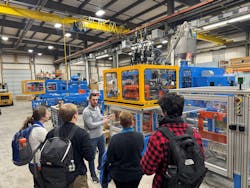Blow Molding Division guides UMass Lowell senior project
The SPE Blow Molding Division's Knowledge and Technology Group (KTG) has multiple subcommittees that focus on educating younger generations, including scholarships, annual sponsorships of PlastiVan, the Student Design Competition, and a newly formed subcommittee in 2024 that sponsors senior projects at universities that teach blow molding.
The division picked University of Massachusetts Lowell (UML) for the first senior project sponsorship. For this project, new product development was the premise.
Project background
New product development projects are a concept-to-reality project in the sense that an idea is either conveyed down from a brand owner, or an internal R&D project, for which various deliverables need to be met. In the blow molding industry, this starts with understanding the application and consumer requirements.
With this information, teams work together to determine the correct resin choice based on performance requirements, the best blow molding process and details about downstream/auxiliaries, etc. Then, the mold and respective die tooling are designed and machined.
The next step is shifting that concept to reality, where the process is established to produce the end product, and finally, quality testing is completed to verify specifications are met.
Delivering the bottle
Three students from UML’s Plastics Engineering program have been assigned to the project— Luke Adam, Brady Dore and Sarah Ross — and they will work on it this spring semester. They then plan to present the project Sept. 8-9 at the Annual Blow Molding Conference in Pittsburgh.
The product requirements are for an HDPE food-grade bottle to be used in the nutritional dry powder market. All costs and components need to be accounted for and presented. Specifics cost associated with material, energy, machinery, labor and packaging components are the focus (projected annual bottle volume to be provided to students).
The goal for the project is for the students to understand the complete process from ideation to commercialization of a product.
The team meets bi-weekly with the subcommittee to review progress and ask questions on the project.
They already have completed a great amount of research and are off to a great start. Early this year, the students traveled to Rocheleau Tool & Die Co. for blow molding 101 training, including hands-on setup and installation of mold and die tooling, and establishing a new process. More hands-on training was conducted at UMass Lowell.
The board is looking forward to continuing these sponsorships and mentorships with young adults with interest in our industry!
This article appeared in the spring 2025 issue of The Journal of Blow Molding.
© 2025, Society of Plastics Engineers Blow Molding Division
About the Author
Lynne Sherwin
Managing Editor
Managing editor Lynne Sherwin handles day-to-day operations and coordinates production of Plastics Machinery & Manufacturing’s print magazine, website and social media presence, as well as Plastics Recycling and The Journal of Blow Molding. She also writes features, including the annual machinery buying survey. She has more than 30 years of experience in daily and magazine journalism.
